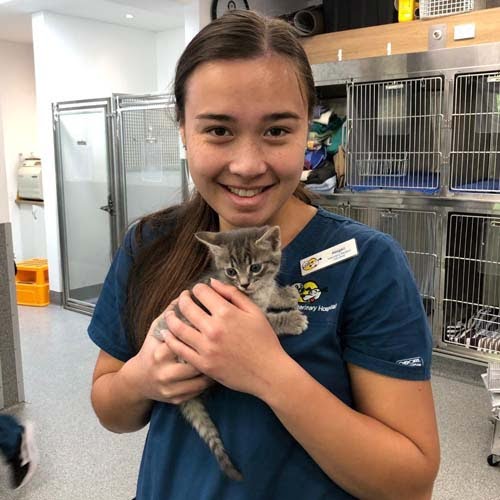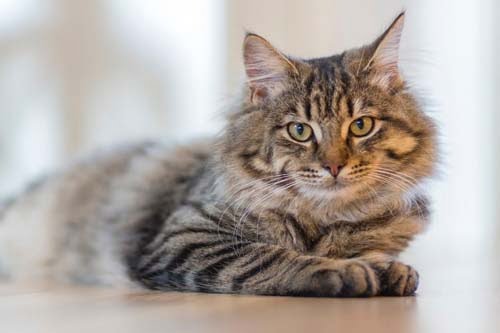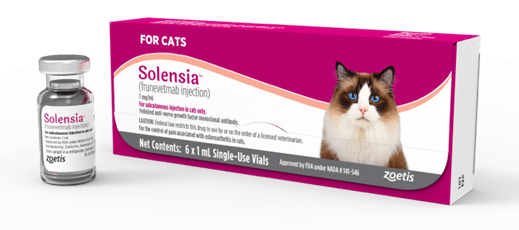Keeping you informed
Newsletter October 2022

Veterinary Nurse Appreciation Day!
(Pictured above from left to right) Nurses Jocelyn, Anna, Liam, Chloe and Stephanie accepting tokens of our appreciation!
It was Veterinary Nurse Appreciation Day on the 14th of October and Turramurra Veterinary Hospital celebrated our Nursing Team with personalised gifts and cupcakes! Pictured below are just a few of our valuable nurses, without whom our pets wouldn’t receive all the love and nursing care they need.
Read about Senior Nurse Anna and her passion for veterinary nursing in our Staff Profile for this month.
NEW! Dog Training Workshops
Pet Behaviour Consultant Katie Bedrossian
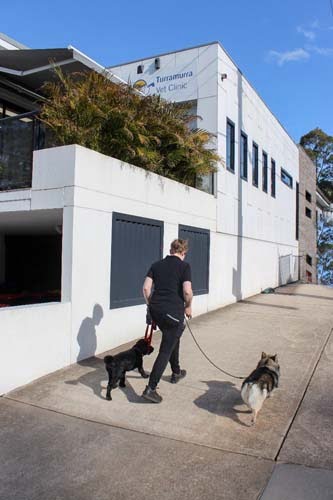 Does your dog pull on their lead? Jump up to greet people? Not come when they’re called while at the dog park? Never fear, as next month, we are launching our new Canine Training Workshops and are currently taking bookings for our first classes! Spots are filling fast, so be sure to give reception a call on 9988-0198 to book your pooch in!
Does your dog pull on their lead? Jump up to greet people? Not come when they’re called while at the dog park? Never fear, as next month, we are launching our new Canine Training Workshops and are currently taking bookings for our first classes! Spots are filling fast, so be sure to give reception a call on 9988-0198 to book your pooch in!
- Walk this Way – Saturday 26th November (loose leash walking)
- Paws to the Floor – Saturday 3rd December (prevent your dog from jumping up on people)
- Total Recall – Saturday 10th December (come when called)
All workshops start at 4pm for 1 hour, Cost? $79 per dog per class with 4-6 participants per class. Bookings are open to young or adult sociable dogs and you can book in for single workshops or more than one, depending on what your dog needs to work on.
Pet Wellness Month
October is not just for scary movies and trick or treating over Halloween, it is actually Pet Wellness Month (which we believe should be every month!). Balance in your pet’s life is just as vital as in your own, so be sure to keep a close eye on their physical and emotional state no matter what time of year it is.

Pet Of The Month: Skye Templeton
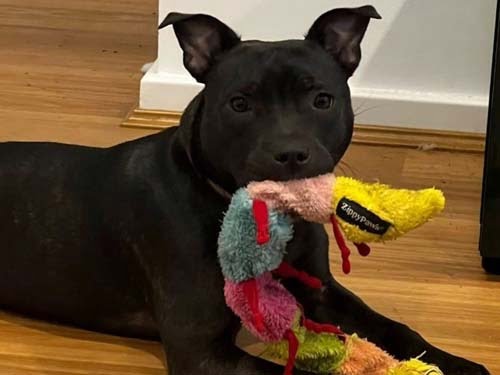
Pictured here is Skye looking so much better with of of her beloved toys. What a trooper!
Skye is the adorable and wiggly Staffordshire Bull Terrier who stole the hearts of the team at Turramurra Veterinary Hospital this month. She showed tenacity and bravery during a very difficult time when she was diagnosed with ibuprofen toxicity, and despite the road to recovery being a long one, she is well on her way to full health.
Ibuprofen toxicity is relatively common due to the high number of households who use the drug, Nurofen or similar ibuprofen generics, for pain relief in people. Ibuprofen in high doses can cause acute kidney damage and gastrointestinal ulceration, both potentially life-threatening problems.
Skye’s treatment involved intravenous fluids (IVF) to support her kidneys, close monitoring of kidney parameters via multiple blood tests and blood pressure monitoring. Skye also developed a nasty urinary tract infection, so needed intravenous antibiotics as well. After initial diagnostics and treatment at Turramurra Veterinary Hospital, Skye was referred for 24/7 critical care in ICU at Northside Emergency Veterinary Service.
We are so glad that Skye’s recovery is going well and she is getting back to her usual self. She has been a dream patient, receiving cuddles and well-wishes from all team members, and as a result we had to recognise her as Pet of the Month for October for being so courageous!
Teaching Adult Dogs New Tricks? Yes! It can be done!
Author: Katie Bedrossian – Pet Behaviour Consultant
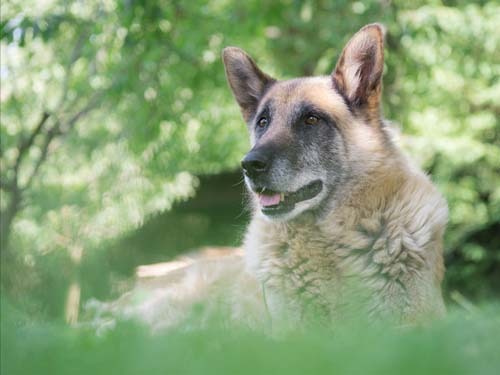
Most people have heard the saying ‘You can’t teach an old dog new tricks’. I am here to tell you that you can teach old dogs new tricks, whether they are 12 months old or 12 years old. And, better yet, adult dogs have a few advantages over young dogs when it comes to learning.
Turramurra Veterinary Hospital’s Pet Behaviour Service offers the following services for adult dogs:
– Daytraining – Let me do the training for you! These sessions take place in the environment the behaviour challenge is occurring, training is fast tracked and then a session for transferring the information to you. Very effective for training a dog that walks calmly on lead, comes when called or discouraging jumping up on people as well as training a desired response to cue words.
– Private Behaviour Consultations – Katie works alongside you with each session to guide you and your dog towards success.
– Group Training Workshops – Single session small group 1 hour classes (4-6 dogs) focusing on one behaviour challenge for dogs of ALL AGES!
The 6 reasons why teaching adult dogs is easier:
- Better emotional regulation. Even if they haven’t learnt the best habits, better emotional regulation means they have more patience to work out what you are teaching them and don’t get frustrated like younger dogs can.
- Observe longer before reacting. While there are various levels of reactivity to a threat depending on the individual, when an individual dog reaches adulthood, they often observe their environment and other dogs’ and people’s behaviour for longer than they did as a younger dog.
- Reduced need for intensive physical and mental exercise to resolve behaviour. While exercise and environmental enrichment is still important for adult dogs, adult dog behaviour is more about creating positive associations, changing routines and engrained habits, than trying to give the dogs outlets during their younger developmental phases.
Click on the link to learn more about teaching your adult dog new tricks.
Could my pet have a food allergy?
Authors: Dr Tee Brown and Dr Gretta Howard – Veterinarians
What is a food allergy?
Our pets are fed a variety of foods and specific proteins (such as beef or chicken) are sometimes recognised by the immune system as foreign invaders to be attacked. The resulting inflammation may target the gastrointestinal tract (causing vomiting and/or diarrhoea) or the skin (causing excessive scratching and/or licking). Unlike many environmental causes of skin allergies, clinical signs associated with a food allergy are typically non-seasonal and can occur all-year-round.
Many people believe that food allergy signs, such as scratching, are the result of a recent change in diet. In fact, the opposite is true. Food allergy requires time to develop and most animals have been eating the offending food for years with no trouble.
Due to their immature immune system, it is uncommon to see food allergy signs in dogs less than 6 months of age but as the immune system matures, food allergy signs can start to emerge. Food allergy is also seen in adult pets so should be ruled out as part of the diagnostic investigation in all pets that have itchy skin or suspicious gastrointestinal signs.
Sometimes rather than a true food allergy, pets can have a food intolerance, which usually results in less severe gastrointestinal signs. On the other hand, severe food allergies affecting the gastrointestinal tract can trigger severe inflammatory bowel disease which in some cases, can be life-threatening.
What are the clinical signs of food allergy causing skin conditions in pet?
A non-seasonal intense itch is the most common sign. The itchiness can be all over the body or limited to a specific region or combination or areas such as the face, ears, feet and pinna, shoulders, on the belly or around the bottom. Some animals will present with recurrent ear infections alone or inflammation around the bottom. Cats commonly present with intense scratching or skin lesions around the face. Some animals with a food allergy have concurrent gastrointestinal signs such as vomiting or diarrhoea.
Click to learn more about pet food allergies.
Feline Friends – Solensia – A New Feline Arthritis Treatment
Author: Dr Amy Howe – Veterinarian
Osteoarthritis, more commonly referred to as ‘arthritis’ in cats, is a painful condition that causes inflammation and degeneration of the joints. Cats can be very good at hiding any outward signs of joint pain, and so often signs of arthritis can be very subtle and difficult to pick up in the home. Recent studies have shown that up to 40% of cats have clinical signs of osteoarthritis, making it a far more common condition than we think.
In March, 2022, a new treatment was approved for use in Australia for cases of feline osteoarthritis, called Solensia (Frunevetmab). Solensia is a monoclonal antibody that specifically targets and reduces the ability of nerve growth factor to cause pain within joints. It is given as a monthly injection underneath the skin, with studies showing 76% of owners seeing noticeable and sustained improvement in signs of pain during treatment.
What is nerve growth factor and why is it important in arthritis?
Nerve growth factor is found within tissues of the joint, and is released following a noxious stimulus alongside other inflammatory mediators. Nerve growth factor binds to nerves and immune cells, as well as cellular components of the joint including cartilage and endothelium. Once it has done this, it sensitises these tissues to further stimuli, thereby increasing inflammation and pain perception. If these pathways are not interrupted, this will cause ongoing pain and inflammation within the joint. Solensia (frunevetmab) binds to and inhibits nerve growth factor, reducing the signaling of pain from the joints, as well as reducing inflammatory mediators within the joint itself.
Is Solensia a safe pain relief option for my cat?
Solensia is an exciting addition to arthritis management in cats, as there currently are limited options for long term pain management in cats. As Solensia is an antibody, it requires minimal involvement of the liver and kidneys for elimination from the body and has been shown to have minimal gastrointestinal side effects. This means it can be considered for cats with chronic kidney disease where other pain relief medications can’t be used.
As part of a holistic approach to arthritis management in cats, Solensia can provide effective pain relief for these patients, thereby improving their mobility, sociability and quality of life. As it is a monthly injection, it also eliminates the need for daily medication which often our feline friends are reluctant to take!
If you think you may be noticing changes in your cat’s activity levels or behaviour at home, a consultation and physical examination with your vet is the first step towards a happy healthy future with your feline friend.
What is nerve growth factor and why is it important in arthritis?
Nerve growth factor is found within tissues of the joint, and is released following a noxious stimulus alongside other inflammatory mediators. Nerve growth factor binds to nerves and immune cells, as well as cellular components of the joint including cartilage and endothelium. Once it has done this, it sensitises these tissues to further stimuli, thereby increasing inflammation and pain perception. If these pathways are not interrupted, this will cause ongoing pain and inflammation within the joint. Solensia (frunevetmab) binds to and inhibits nerve growth factor, reducing the signaling of pain from the joints, as well as reducing inflammatory mediators within the joint itself.
Is Solensia a safe pain relief option for my cat?
Solensia is an exciting addition to arthritis management in cats, as there currently are limited options for long term pain management in cats. As Solensia is an antibody, it requires minimal involvement of the liver and kidneys for elimination from the body and has been shown to have minimal gastrointestinal side effects. This means it can be considered for cats with chronic kidney disease where other pain relief medications can’t be used.
As part of a holistic approach to arthritis management in cats, Solensia can provide effective pain relief for these patients, thereby improving their mobility, sociability and quality of life. As it is a monthly injection, it also eliminates the need for daily medication which often our feline friends are reluctant to take!
If you think you may be noticing changes in your cat’s activity levels or behaviour at home, a consultation and physical examination with your vet is the first step towards a happy healthy future with your feline friend.
Staff Profile: Nurse – Anna
Why did you choose to pursue a career as a Veterinary Nurse?
Following university, I had initially worked in a very different field to the veterinary industry, though I always loved being around animals. It took me some time to determine that I didn’t find my then career path very fulfilling, so instead I went in search of what had always made me happy. Veterinary nursing allowed me to combine my love of animals with my interest in medicine, and though it is certainly not an easy career path, it is deeply rewarding.
What is the most unusual case you have seen at Turramurra Veterinary Hospital?
We see quite a lot of unusual cases at TVH, so it is difficult to narrow down just one! One that comes to mind quite recently was a Cocker Spaniel that had been brought in by his owners after suspicion of consuming almonds. This was very sensible as almonds are not very digestible for dogs and can cause gastrointestinal upset. They can also induce pancreatitis in some dogs due to their high fat content.
Emesis (vomiting) was induced to remove the almonds from the stomach. This in itself is not unusual at all, however you can imagine our surprise when in addition to a very large quantity of almonds, our Cocker Spaniel friend also vomited up a retractable tape measure, hair ties and parts of a bright blue soft toy!
What do you most enjoy about working with the Turramurra Veterinary Hospital team?
I really enjoy and respect the entire team’s commitment to providing the highest possible standards of care for our animal patients and clients. From the customer care team, nurses, vets and through to management, it really is at the forefront of everyone’s priority list. I am proud to be part of a veterinary team with such dedication to their patients and clients.
Do you have any particular areas of interest?
My main interests are anaesthesia and analgesia as well as emergency response nursing. I find the concept of pain management fascinating, and I love being able to ensure pets have the most comfortable experience that they can, whether in hospital for a routine procedure or a serious medical emergency. I also really enjoy training new nurses in all aspects of the profession – it’s wonderful to see our new trainee nurses become confident in their own skills and knowledge.
Innovations: Intravenous Fluids
Author: Freya Britt-Lewis – Customer Care & Pet Health Writer
Editor: Dr Gretta Howard – Veterinarian
Intravenous fluid therapy is commonly used for a whole host of clinical problems, as well as during procedures requiring anaesthesia. The fluids are administered via an intravenous catheter. A catheter is a sterile tube put into a peripheral vein that allows the administration of various types of fluids, medications and anaesthetic induction agents.
Our veterinarians use an intravenous catheter placed in the leg to funnel a continuous drip of fluids directly into the bloodstream. This procedure is not painful, with patients being moved to a comfortable hospital bed and allowed to relax as soon as possible after placement. If needed they will receive oral or injectable medications alongside the fluid therapy.
When would we use intravenous fluid therapy?
IVF is used as supportive therapy in veterinary medicine and surgery when treating many different medical conditions as well as to keep our animal patients hydrated with a normal blood pressure.
Below are examples of some of the conditions where IVF is utilised in veterinary practice:
- Anaesthesia
- Dehydration
- Kidney or liver disease
- Vomiting
- Severe diarrhoea
- Pancreatitis
- Toxicities
- Trauma
- Shock
- Low blood pressure
- Bleeding disorders
The use of intravenous fluid therapy throughout an anaesthetic procedure will aid in faster metabolism of anaesthetic agents, maintenance of normal blood pressure and therefore, a speedier recovery.
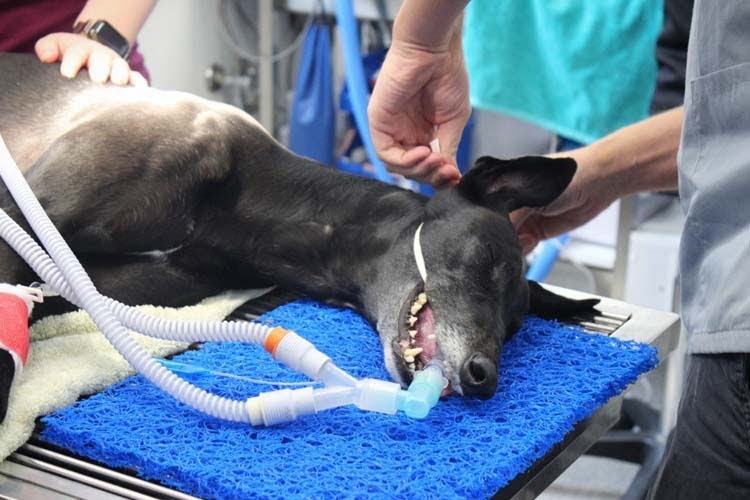
Molly the Greyhound has intravenous fluids during her dental procedure under anaesthesia
Click through to read more on intravenous fluid therapy.
Ask the Vet!
Author: Dr Pip Wines – Senior Veterinarian
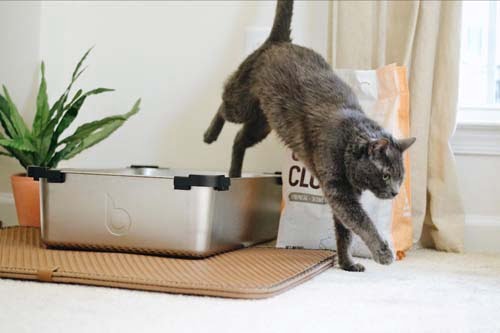
1) My cat is urinating small amounts of pink coloured urine in my shower recess – what is wrong?
If you see any changes in your cat’s urination then we should see them as soon as possible, as there are many reasons that this could be occurring.
Cats are prone to a syndrome called FLUTD: feline lower urinary tract disease. This can be caused by stress, infection or bladder/urinary tract stones and crystals. We would need to get a thorough clinical history and check your cat’s urine before we would be able to tell you the exact cause.
Any time you see your cat trying to wee and nothing coming out should be considered an emergency and you should contact us immediately.
2) My dog has vomited once this morning but now she is starting to retch and bring up clear frothy fluid. Should I be concerned?
Yes, you should be concerned, and we should see your dog straight away. Particularly during Spring and Summer, this is a typical sign that your dog may have tick toxicity, however ticks are around all year and should be considered a possibility at any time.
Serious heart disease can also cause retching and clear frothy fluid production, so an urgent veterinary consultation is crucial.
Gastroenteritis or foreign bodies stuck in the gastrointestinal tract or oesophagus, may also show these common clinical signs.
If you see this, please ensure you book a veterinary examination straight away so we can ensure your dog is back to good health as soon as possible.
3) My Labrador is shaking his head excessively – should I bring him in for a check?
Shaking of the head is a very common sign that your dog may have an ear irritation. This can be associated with an ear infection, or it may be that there is something stuck in his ear.
Vigorous head shaking can sometimes result in a problem called an aural hematoma, which is when the ear swells up with blood and can be very uncomfortable for your dog.
Occasionally dogs will shake their head if they have dental disease, a skin irritation or even a headache.
Having a thorough veterinary examination will help differentiate between these problems and get your Labrador feeling better as soon as possible.
We hope you have enjoyed our newsletter and would love to hear from you!
We are always happy to receive feedback from our clients, so feel free to send an email to Kelly Lawrence by emailing manager@turramurravet.com.au as we always strive to improve our service.
Thank you! Best wishes, your locally family-owned and independent Turramurra Veterinary Hospital team.
